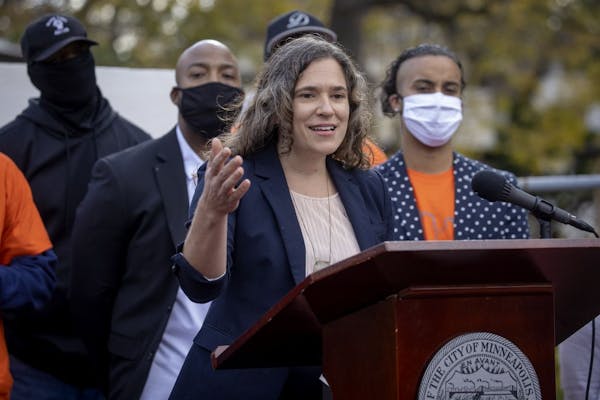Minneapolis Mayor Jacob Frey and Police Chief Medaria Arradondo on Monday rebuffed a proposal by three City Council members to cut the Minneapolis police budget by nearly $8 million, with Frey calling the plan "irresponsible and untenable" amid a year of rising violent crime and a shrinking police force.
Although both said they support some community alternatives and reforms in policing, they said it cannot come at the cost of further cuts to the department already facing historic attrition rates — the force is down 120 officers since the start of the year, with more likely to depart.
"This notion that in order to have a more comprehensive public safety strategy you have to do away with one critical element, which is police, is wrong," Frey said. "We are hearing from communities right now that they are looking for a 'both-and' approach."
"This is literally a life and death matter right now and we need to get it right," he said.
The proposal by a trio of City Council members — including President Lisa Bender, Phillipe Cunningham and Steve Fletcher — would move roughly 5% from MPD to violence prevention, a mental health crisis team and other departments that could help process reports of property damage and parking violations. The change, they said, would reduce officers' overall workloads and allow them to focus on violent crime.
The council members' proposal would fund a department with roughly 770 officers and reduce the authorized force size to 750 in future years. That's far lower than the 888 "target level" included in Frey's budget proposal.
Those three council members were on the losing side of a 7-6 vote this month to spend $500,000 for other law enforcement agencies to help the Minneapolis police patrol the city. However, contracts have yet to be signed.
Frey's budget plan includes roughly $1.5 billion in spending for 2021, about $179 million of which would go to the Police Department. His plan calls for adding three recruit classes to help offset a wave of officer departures following the death of George Floyd and subsequent riots.
At least 120 officers remain on some form of leave, many of whom have filed disability claims related to PTSD.
Arradondo cited more than 500 shootings and nearly 80 homicides, saying it would be "reckless and dangerous" to reduce department numbers without awaiting the results of a city-sanctioned study of MPD staffing numbers.
"We need to dream about a better future, but we cannot sleepwalk on public safety of our residences and our businesses," Arradondo said. "Crime is occurring, the shootings, the carjackings, the robberies. They are citywide, they are impacting everyone, and not just one constituency base and not just one neighborhood."
Within a one-hour period Saturday morning, police reported three separate carjackings in southeast Minneapolis, including one where an elderly woman was struck on the head. The often brazen, daytime attacks are up 537% this month when compared with last November, said police spokesman John Elder.
The crime wave has been a source of tension between Arradondo and the council, whose members have grilled the chief on exactly how he'd spend the department's budget and how additional funding would make a difference if prior efforts to stem the violence have failed.
Arradondo frequently notes that about 90% of the department's budget goes toward officers' salaries and benefits.
In an e-mail to constituents ahead of Frey and Arradondo's remarks, Fletcher lauded the "Safety for All Budget Proposal" as a data-driven solution to start transforming the current policing structure while reining in overtime spending.
"These investments will reduce the burden on our police department, deliver more effective and appropriate responses when people in our communities need help, and prevent and interrupt cycles of violence," he wrote.
In the two weeks following Floyd's death, Minneapolis shelled out more than $3.3 million in police overtime costs — about 37 times more than normal, pushing the department past its annual budget. Since them, some council members have questioned whether the city should continue authorizing unprecedented levels of overtime.
But Frey and Arradondo countered that while overtime should not be used as a de facto model for staffing, it is simply unavoidable, particularly in crisis situations.
In response to the news conference, Fletcher said that any debate over future staffing levels is "philosophical."
"I actually thought that what we did was very thoughful," he said of the new plan. "I think we're really solving problems that aren't solved in the budget that was presented to us."
Bender and Cunningham could not immediately be reached for comment.
Minneapolis residents are still torn over whether the Police Department is best suited to improve safety in the city — and how much to invest in it — months after the police killing of Floyd and in a year marred by violent crime.
More than 200 people have signed up to speak at Wednesday night's truth-in-taxation hearing. The full 13-member council is expected to weigh in on the new proposal Thursday.
To move forward, it will require approval from at least seven council members. As mayor, Frey has veto power, but it can be overridden by a two-thirds council majority.
Liz Sawyer • 612-673-4648

Want to share info with the Star Tribune? How to do it securely

'Safe recovery sites' would offer syringes, naloxone and more to people using drugs. The plan could be in peril.
New Minnesota GOP leaders seek peace with party's anti-establishment wing

Who is Republican Lisa Demuth, Minnesota's first House speaker of color?

